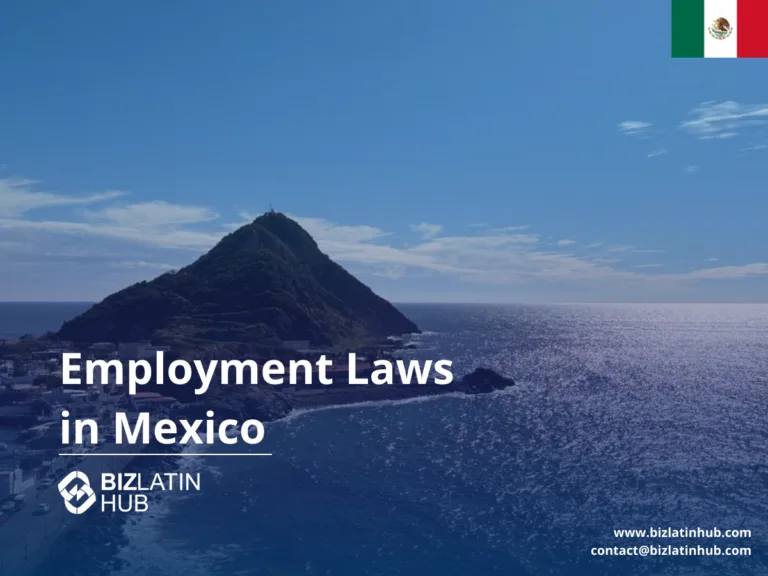Understanding Mexico’s employment and labor law is essential for companies hiring locally. This guide explains employment contracts, employee rights, working hours, benefits, and social security requirements under Mexican labor law. For anyone interested in company formation or who is already doing business in this North American country, understanding and studiously adhering to employment law in Mexico will give you a greater guarantee of success while maintaining the good standing of your company in the eyes of authorities.
Key Takeaways
| What are the working hours mandated by employment law in Mexico? | Employment law in Mexico sets a maximum work schedule of 8 hours per day and 48 hours per week, not including overtime. |
| What Is The Mexican Minimum Wage? | The current minimum wage as of January 2025 is MXN$278.80 (Approx. USD$13.50) per day. In the Free Zone of the Northern Border, the minimum wage is MXN$419.88 pesos (Approx. USD$20) per day. |
| Types of Employment Contracts in Mexico | Fixed-term. Indefinite-term. Seasonal Contracts. |
| What percentage of an employee’s salary contributed to social security in Mexico? | According to employment law in Mexico, employers must contribute to the social security fund equivalent to 26% of an employee’s salary, while a contribution equal to 5.15% must be made to the pension fund. An additional contribution equal to 5% of an employee’s salary is also made to the National Housing Fund. |
Types of Employment Contracts in Mexico
There are three main types of contract allowed under employment law in Mexico that investors tend to use;
Indefinite-term contracts
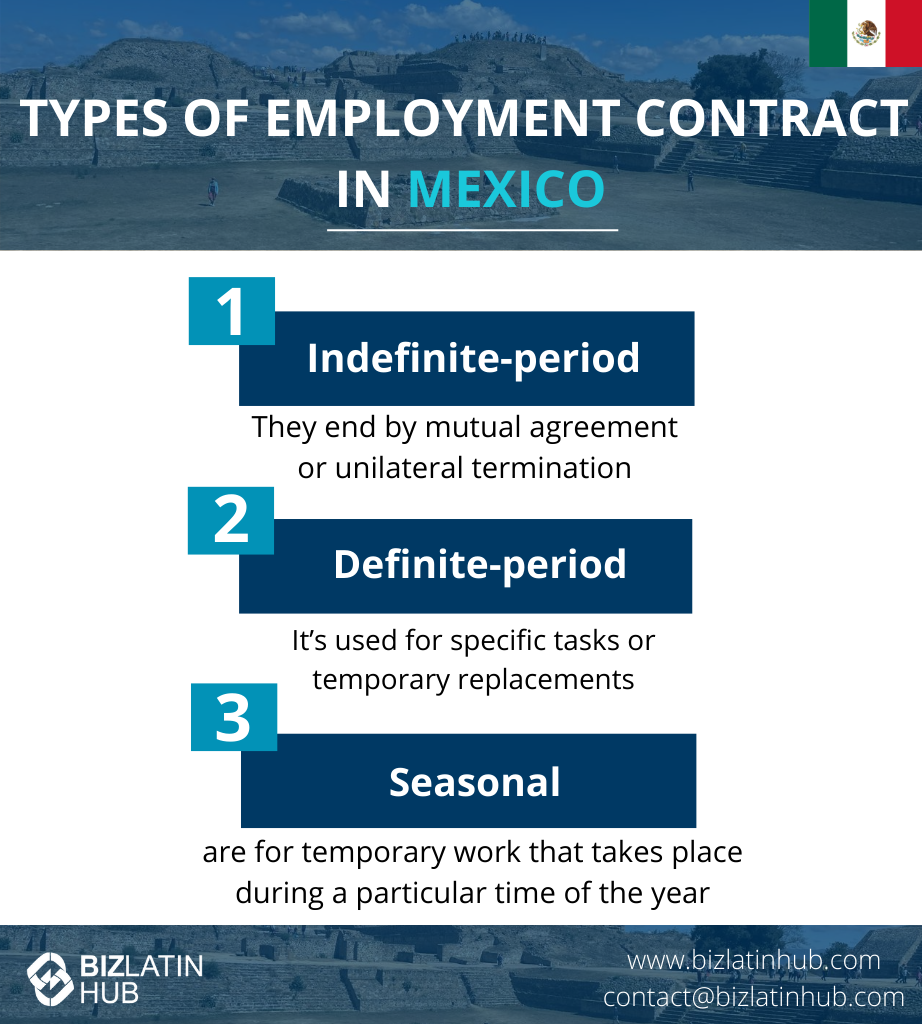
These are the most widely-used contracts and only end based on mutual agreement between the employer and employee, or when one of the parties has the right to act unilaterally. That right includes an employee’s resignation from their role or an instance of employee misconduct that warrants dismissal by the employer.
Fixed-term and seasonal contracts
The former can only used either when the nature of the task warrants it, such as for a particular project, or when replacing another worker temporarily, such as for maternity leave or to cover another type of extended absence.
The latter may only be provided for fixed work of a limited nature that only occurs during a specific period of the year, such as a tourist season or harvest.
Work Hours, Overtime, and Leave
Under employment law in Mexico, a standard working week is 48 hours long, made up of six days of eight hours and one rest day, normally Sunday. This is enforced by the secretariat of work.
If an employee works for more than 48 hours in a week, they are entitled to additional and proportionate pay for the extra hours worked. Employees are also entitled to a 25% premium on their standard salary when they work on a Sunday, according to Mexican labor laws.
Note that in Mexico, there are generally eight national holidays that fall on weekdays each calendar year, as well as one regional holiday.
The working day is the time during which the worker is at the disposal of the employer to perform his or her work. The Federal Labor Law establishes the following types of working hours:
- Daytime: Between 6:00 AM to 20:00 PM
- Nightly: Between 20:00 PM to 6:00 AM
- Mixed: When the shift is arranged with daytime and nightly working hours. The night period must be less than three and a half hours.
The maximum working hours shall be: eight hours during the day, seven hours at night, and seven and a half hours when it is mixed.
Under employment law, there are statutory benefits that are mandatory for employees to receive:
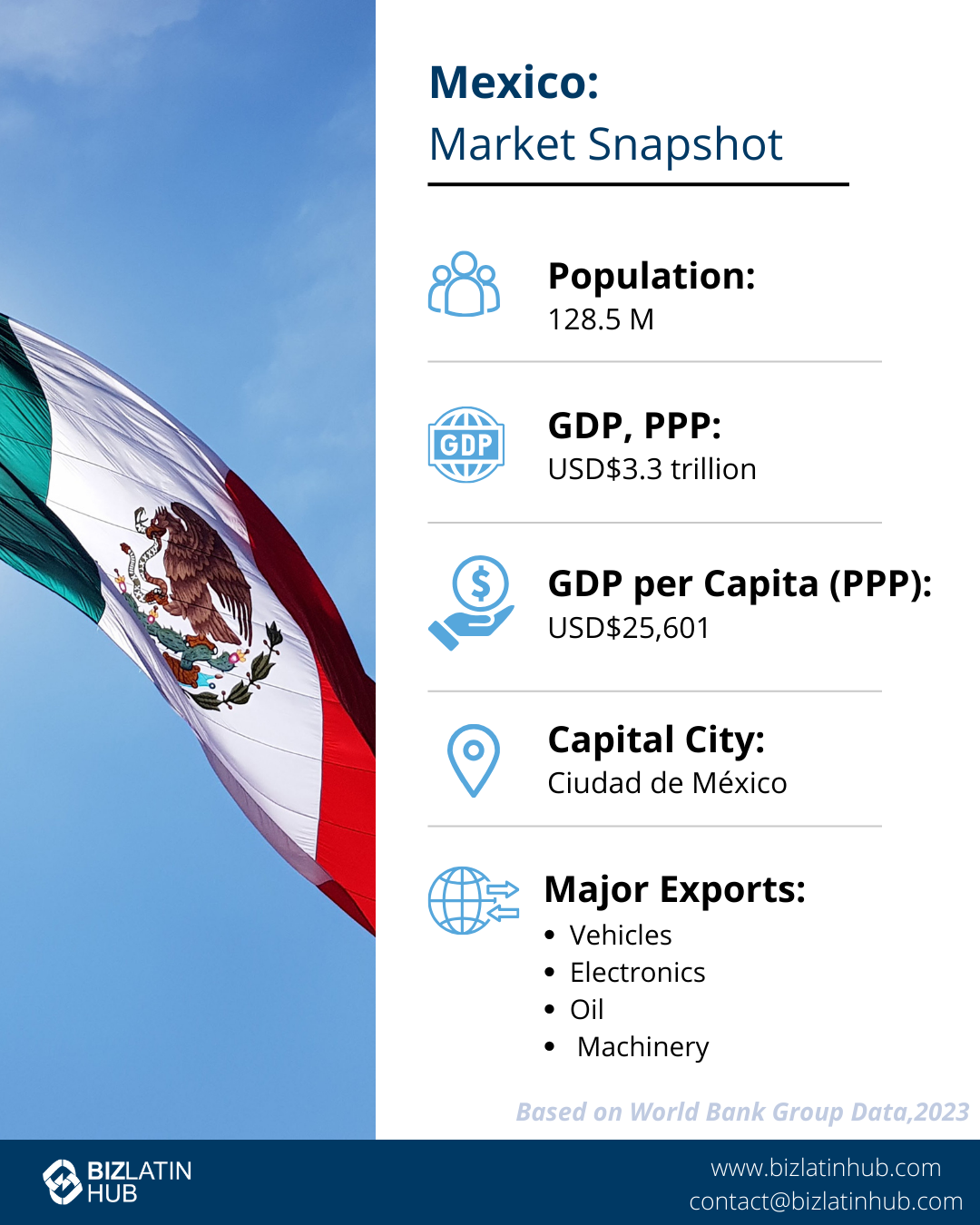
- Christmas bonus: Must be paid before December 20th each year and shall be equivalent to 15 days of salary.
- Vacation bonus: The employee shall receive a vacation bonus equivalent to 25% of their base salary.
- Sunday bonus: If the employee works on Sundays, shall receive 25% of the daily base salary.
- Seniority bonus: if an employee served more than 15 years, they are entitled to 12 days of pay for every year worked.
- The employer can give the employees more benefits, these are the minimums.
No employee can renounce these legal benefits, they are protected by the constitution and it is the employer’s obligation to provide them on time.
Termination and Severance Pay
Under employment law in Mexico, there is no minimum notice period that employees must provide when they resign, meaning that an employee can resign with immediate effect without penalty. However, it is common for a notice period to be written into the employment contract.
When an employee leaves voluntarily, they are entitled to receive a proportional part of their law benefits depending on number of days worked.
If an employer decides to dismiss an employee without just cause, the employee is entitled to compensation that includes:
- Payment for all hours worked
- Three additional months of salary
- 20 days of pay for every year worked
- Seniority subsidy where applicable
- Payment for outstanding vacations
- A proportion of their annual bonus is based on how much of the year they have worked
In the event of dismissal with just cause, such as a crime being committed against the company or persistent absence, the employer must provide the employee with written notice in which a clear referral is made to the conduct warranting the dismissal, as well as the date or dates upon which it occurred.
What does employment law in Mexico say about absences?
Employment law in Mexico lays out that employees are entitled to an annual vacation period established by Article 76 of the Federal Labor Law and as described on the following chart:
| Full time Regular Tenure | Vacation Days Annual Accrual |
|---|---|
| Once the employee has completed the first year of work | 12 days |
| After his/her 3-year anniversary | 16 days |
| After his/her 6-year anniversary | 20 days |
From the sixth year onwards, the leave period shall be increased by two days for every five years of service.
- Maternity and paternity leave: New mothers are granted a total of 12 weeks of maternity leave, which begins six weeks prior to a due date documented by a medical professional. In the event of adoption, a new mother is granted six weeks of maternity leave from the day of the adoption.
For new fathers, five days of paternity leave are granted, including in the case of adoption. - Sick leave: In case of non-occupational illness or injury, an injured employee is entitled to all necessary medical care from the onset of the illness, as well as financial compensation when their illness or injury prevents them from working.
This compensation will be paid by the social security fund at a rate of 60% of their normal salary, starting from the fourth day of their absence, and extended for up to 52 weeks. This is promised by Mexico’s labor laws. - Bereavement leave: Under employment law in Mexico, there is no statutory right to leave in the case of bereavement, and any such allowance must be agreed with the employer in the event it is not laid out in the terms of the employment contract.
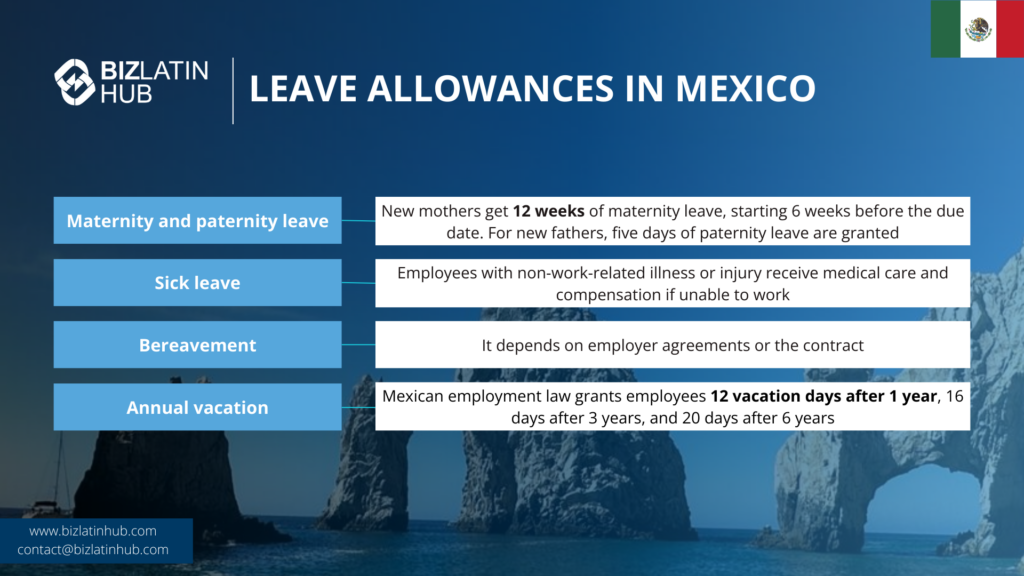
Employment law in Mexico: Statutory contributions
- Employee deductions: Income tax is deducted progressively, at a rate that ranges from 1.92% to 35% based on monthly earnings. That top band applies to anyone earning MXN$3,898,140 per year (approximately USD$191,226). Additionally, employees have 1.025% of their salary deducted for social security contributions and a further 1.75% deducted for pension contributions.
Employee deductions: Income tax is deducted progressively, at a rate that ranges from 1.92% to 35% based on monthly earnings. That top band applies to anyone earning MXN$3,898,140 per year (approximately USD$191,226). Additionally, employees have 1.025% of their salary deducted for social security contributions and a further 1.75% deducted for pension contributions. - Employer contributions: According to employment law in Mexico, employers must contribute to the social security fund equivalent to 26% of an employee’s salary, while a contribution equal to 5.15% must be made to the pension fund. An additional contribution equal to 5% of an employee’s salary is also made to the National Housing Fund.
- Profit sharing: Mexican employment law includes a provision for profit sharing, known as PTU. That requires companies to share 10% of their net annual profits with most employees (see the list of who is eligible in our guide to PTU in Mexico), with 5% of the payment distributed evenly among all eligible employees based on number of days worked during the financial year, while the second 5% is distributed to employees in proportion to the salary they earned during that period. The ministry of labor enforces these statutory contributions strictly.
| Category | Employer Obligations | Employee Rights |
|---|---|---|
| Minimum Wage | Pay legal daily minimum wage (varies by zone) | Receive daily minimum wage or higher |
| Work Hours | Max 48 hours/week (or 42 in mixed shifts) | Overtime protection, rest days |
| Social Security | Register with IMSS and pay monthly contributions | Access to healthcare, pension, and maternity leave |
| Paid Leave | Provide vacation after 1 year (12 days minimum from 2023) | Annual paid leave increases with tenure |
| Termination | Pay severance or justified termination | Due process and compensation if dismissed unjustly |
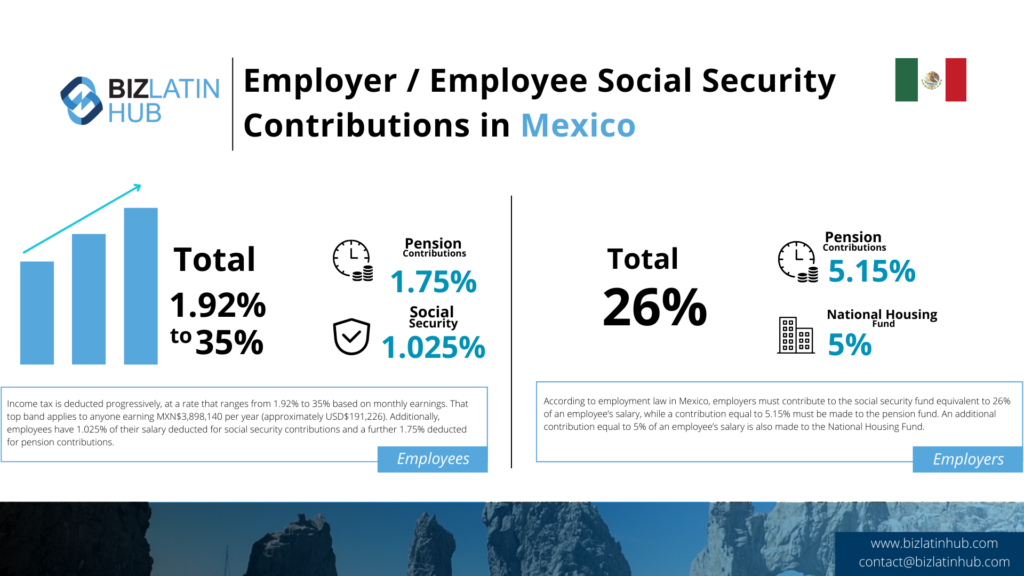
FAQs about employment law in Mexico
In our experience, these are the most common questions our clients ask.
1. What are the labor laws in Mexico?
In Mexico, the standard workweek typically consists of 48 hours, and employment contracts may be either fixed-term or indefinite. The country has a national minimum wage, and employees are entitled to annual paid leave. Maternity leave is granted with full pay, and social security contributions encompass health and retirement benefits. Mexican labor laws recognize collective bargaining rights and the right to strike.
2. What social security contributions are required?
Employers must register workers with IMSS and contribute to:
Health insurance
Pension
Risk insurance
INFONAVIT housing fund
3. How many hours are in a standard work day in Mexico?
The workday for the Mexican worker is eight hours and it is divided into three shifts. The day shift starts at 6:00 am and ends at 8:00 pm, allowing for a flexible 14-hour workday.
4. What is the minimum salary in Mexico?
The minimum salary in Mexico has been increased to MXN$278.80 (Approx. USD$13.50) per day for employees working in the country. In the Free Zone of the Northern Border, the minimum wage has been raised to MXN$419.88 pesos (Approx. USD$20) per day. This increase applies to all employees in Mexico.
5. How is overtime paid in Mexico?
Overtime in Mexico is paid at a rate that is 100 per cent higher than the regular working hours. If the overtime exceeds nine hours per week, the employer is required to pay the worker at a rate that is 200 per cent higher than the regular working hours.
6. Can a foreign company hire staff in Mexico without a local entity?
No. Foreign entities must either incorporate or use an Employer of Record (EOR) to hire legally in Mexico.
7. What severance pay is owed for termination without cause?
Employers must pay:
3 months of salary
20 days’ salary per year of service
Accrued benefits (e.g., vacation, bonuses)
8. What happens when an employee quits in Mexico?
When an employee decides to quit their job in Mexico, they are considered to have voluntarily resigned. In this situation, the employee is entitled to receive the proportional part of their statutory benefits depending on the number of days worked. This means that the employer is responsible for providing all accumulated benefits, which include Christmas bonuses, vacations, Sunday bonuses, extra hours, and seniority bonuses if applicable.
9. Are written employment contracts required in Mexico?
Yes. All employment relationships must be formalized in written contracts, clearly specifying terms, compensation, and benefits.
10. What is the vacation entitlement in Mexico?
Employees receive a minimum of 12 days of vacation after 1 year of service (increased from 6 days in 2023). Vacation days increase with each year of service.
11. What is the maximum legal working week in Mexico?
Mexico’s Federal Labor Law sets a maximum of 48 hours per week, with one rest day. Mixed and night shifts have lower maximums (42 and 45 hours, respectively).
Biz Latin Hub can assist you with employment law in Mexico
At Biz Latin Hub, we provide integrated packages of back-office services that are tailored to every need.
Our portfolio includes accounting & taxation, company formation, due diligence, legal services, and hiring & PEO, and we are active in 16 markets around Latin America and the Caribbean, making us ideal partners for supporting multi-jurisdiction market entry and cross-border operations.
Our experience and understanding of the markets where we operate means that working with us comes with the guarantee of compliance with all local regulations, be that employment law in Mexico or any other legal code related to investment.
Contact us today to find out more about how we can support you doing business in Mexico.
Or learn more about our team and expert authors.

